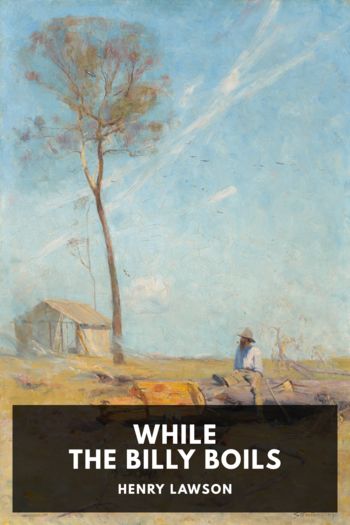While the Billy Boils, Henry Lawson [hardest books to read .txt] 📗

- Author: Henry Lawson
Book online «While the Billy Boils, Henry Lawson [hardest books to read .txt] 📗». Author Henry Lawson
It was a very mean station, and Mitchell thought he had better go himself and beard the overseer for tucker. His mates were for waiting till the overseer went out on the run, and then trying their luck with the cook; but the self-assertive and diplomatic Mitchell decided to go.
“Good day,” said Mitchell.
“Good day,” said the manager.
“It’s hot,” said Mitchell.
“Yes, it’s hot.”
“I don’t suppose,” said Mitchell; “I don’t suppose it’s any use asking you for a job?”
“Naw.”
“Well, I won’t ask you,” said Mitchell, “but I don’t suppose you want any fencing done?”
“Naw.”
“Nor boundary-riding’?”
“Naw.”
“You ain’t likely to want a man to knock round?”
“Naw.”
“I thought not. Things are pretty bad just now.”
“Na—yes—they are.”
“Ah, well; there’s a lot to be said on the squatter’s side as well as the men’s. I suppose I can get a bit of rations?”
“Ye-yes.” (Shortly)—“Wot d’yer want?”
“Well, let’s see; we want a bit of meat and flour—I think that’s all. Got enough tea and sugar to carry us on.”
“All right. Cook! have you got any meat?”
“No!”
To Mitchell: “Can you kill a sheep?”
“Rather!”
To the cook: “Give this man a cloth and knife and steel, and let him go up to the yard and kill a sheep.” (To Mitchell) “You can take a forequarter and get a bit of flour.”
Half an hour later Mitchell came back with the carcass wrapped in the cloth.
“Here yer are; here’s your sheep,” he said to the cook. “That’s all right; hang it in there. Did you take a forequarter?”
“No.”
“Well, why didn’t you? The boss told you to.”
“I didn’t want a forequarter. I don’t like it. I took a hindquarter.”
So he had.
The cook scratched his head; he seemed to have nothing to say. He thought about trying to think, perhaps, but gave it best. It was too hot and he was out of practice.
“Here, fill these up, will you?” said Mitchell. “That’s the tea-bag, and that’s the sugar-bag, and that’s the flour-bag.” He had taken them from the front of his shirt.
“Don’t be frightened to stretch ’em a little, old man. I’ve got two mates to feed.”
The cook took the bags mechanically and filled them well before he knew what he was doing. Mitchell talked all the time.
“Thank you,” said he—“got a bit of baking-powder?”
“Ye-yes, here you are.”
“Thank you. Find it dull here, don’t you?”
“Well, yes, pretty dull. There’s a bit of cooked beef and some bread and cake there, if you want it!”
“Thanks,” said Mitchell, sweeping the broken victuals into an old pillow-slip which he carried on his person for such an emergency. “I s’pose you find it dull round here.”
“Yes, pretty dull.”
“No one to talk to much?”
“No, not many.”
“Tongue gets rusty?”
“Ye—es, sometimes.”
“Well, so long, and thank yer.”
“So long,” said the cook (he nearly added “thank yer”).
“Well, good day; I’ll see you again.”
“Good day.”
Mitchell shouldered his spoil and left.
The cook scratched his head; he had a chat with the overseer afterwards, and they agreed that the traveller was a bit gone.
But Mitchell’s head wasn’t gone—not much: he was a Sydney jackeroo who had been round a bit—that was all.
The Bush Undertaker“Five Bob!”
The old man shaded his eyes and peered through the dazzling glow of that broiling Christmas Day. He stood just within the door of a slab-and-bark hut situated upon the bank of a barren creek; sheep-yards lay to the right, and a low line of bare, brown ridges formed a suitable background to the scene.
“Five Bob!” shouted he again; and a dusty sheepdog rose wearily from the shaded side of the but and looked inquiringly at his master, who pointed towards some sheep which were straggling from the flock.
“Fetch ’em back,” he said confidently.
The dog went off, and his master returned to the interior of the hut.
“We’ll yard ’em early,” he said to himself; “the super won’t know. We’ll yard ’em early, and have the arternoon to ourselves.”
“We’ll get dinner,” he added, glancing at some pots on the fire. “I cud do a bit of doughboy, an’ that theer boggabri’ll eat like tater-marrer along of the salt meat.” He moved one of the black buckets from the blaze. “I likes to keep it jist on the sizzle,” he said in explanation to himself; “hard bilin’ makes it tough—I’ll keep it jist a-simmerin’.”
Here his soliloquy was interrupted by the return of the dog.
“All right, Five Bob,” said the hatter, “dinner’ll be ready dreckly. Jist keep yer eye on the sheep till I calls yer; keep ’em well rounded up, an’ we’ll yard ’em afterwards and have a holiday.”
This speech was accompanied by a gesture evidently intelligible, for the dog retired as though he understood English, and the cooking proceeded.
“I’ll take a pick an’ shovel with me an’ root up that old black fellow,” mused the shepherd, evidently following up a recent train of thought; “I reckon it’ll do now. I’ll put in the spuds.”
The last sentence referred to the cooking, the first to a black fellow’s grave about which he was curious.
“The sheep’s a-campin’,” said the soliloquizer, glancing through the door. “So me an’ Five Bob’ll be able to get our dinner in peace. I wish I had just enough fat to make the pan siss; I’d treat myself to a leatherjacket; but it took three weeks’ skimmin’ to get enough for them theer doughboys.”
In due time the dinner was dished up; and the old man seated himself on a block, with the lid of a gin-case across his knees for a table. Five Bob squatted opposite with the liveliest interest and appreciation depicted on his intelligent countenance.
Dinner proceeded very quietly, except when the carver paused to ask the dog how some tasty morsel went with him, and Five Bob’s tail declared that it went very well indeed.
“Here y’are, try this,”





Comments (0)